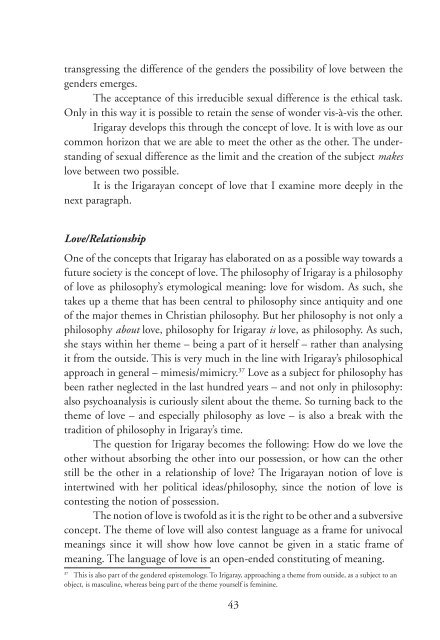Teaching Subjectivity. Travelling Selves for Feminist ... - MailChimp
Teaching Subjectivity. Travelling Selves for Feminist ... - MailChimp
Teaching Subjectivity. Travelling Selves for Feminist ... - MailChimp
You also want an ePaper? Increase the reach of your titles
YUMPU automatically turns print PDFs into web optimized ePapers that Google loves.
transgressing the difference of the genders the possibility of love between the<br />
genders emerges.<br />
The acceptance of this irreducible sexual difference is the ethical task.<br />
Only in this way it is possible to retain the sense of wonder vis-à-vis the other.<br />
Irigaray develops this through the concept of love. It is with love as our<br />
common horizon that we are able to meet the other as the other. The understanding<br />
of sexual difference as the limit and the creation of the subject makes<br />
love between two possible.<br />
It is the Irigarayan concept of love that I examine more deeply in the<br />
next paragraph.<br />
Love/Relationship<br />
One of the concepts that Irigaray has elaborated on as a possible way towards a<br />
future society is the concept of love. The philosophy of Irigaray is a philosophy<br />
of love as philosophy’s etymological meaning: love <strong>for</strong> wisdom. As such, she<br />
takes up a theme that has been central to philosophy since antiquity and one<br />
of the major themes in Christian philosophy. But her philosophy is not only a<br />
philosophy about love, philosophy <strong>for</strong> Irigaray is love, as philosophy. As such,<br />
she stays within her theme – being a part of it herself – rather than analysing<br />
it from the outside. This is very much in the line with Irigaray’s philosophical<br />
approach in general – mimesis/mimicry. 37 Love as a subject <strong>for</strong> philosophy has<br />
been rather neglected in the last hundred years – and not only in philosophy:<br />
also psychoanalysis is curiously silent about the theme. So turning back to the<br />
theme of love – and especially philosophy as love – is also a break with the<br />
tradition of philosophy in Irigaray’s time.<br />
The question <strong>for</strong> Irigaray becomes the following: How do we love the<br />
other without absorbing the other into our possession, or how can the other<br />
still be the other in a relationship of love? The Irigarayan notion of love is<br />
intertwined with her political ideas/philosophy, since the notion of love is<br />
contesting the notion of possession.<br />
The notion of love is twofold as it is the right to be other and a subversive<br />
concept. The theme of love will also contest language as a frame <strong>for</strong> univocal<br />
meanings since it will show how love cannot be given in a static frame of<br />
meaning. The language of love is an open-ended constituting of meaning.<br />
37<br />
This is also part of the gendered epistemology. To Irigaray, approaching a theme from outside, as a subject to an<br />
object, is masculine, whereas being part of the theme yourself is feminine.<br />
43

















